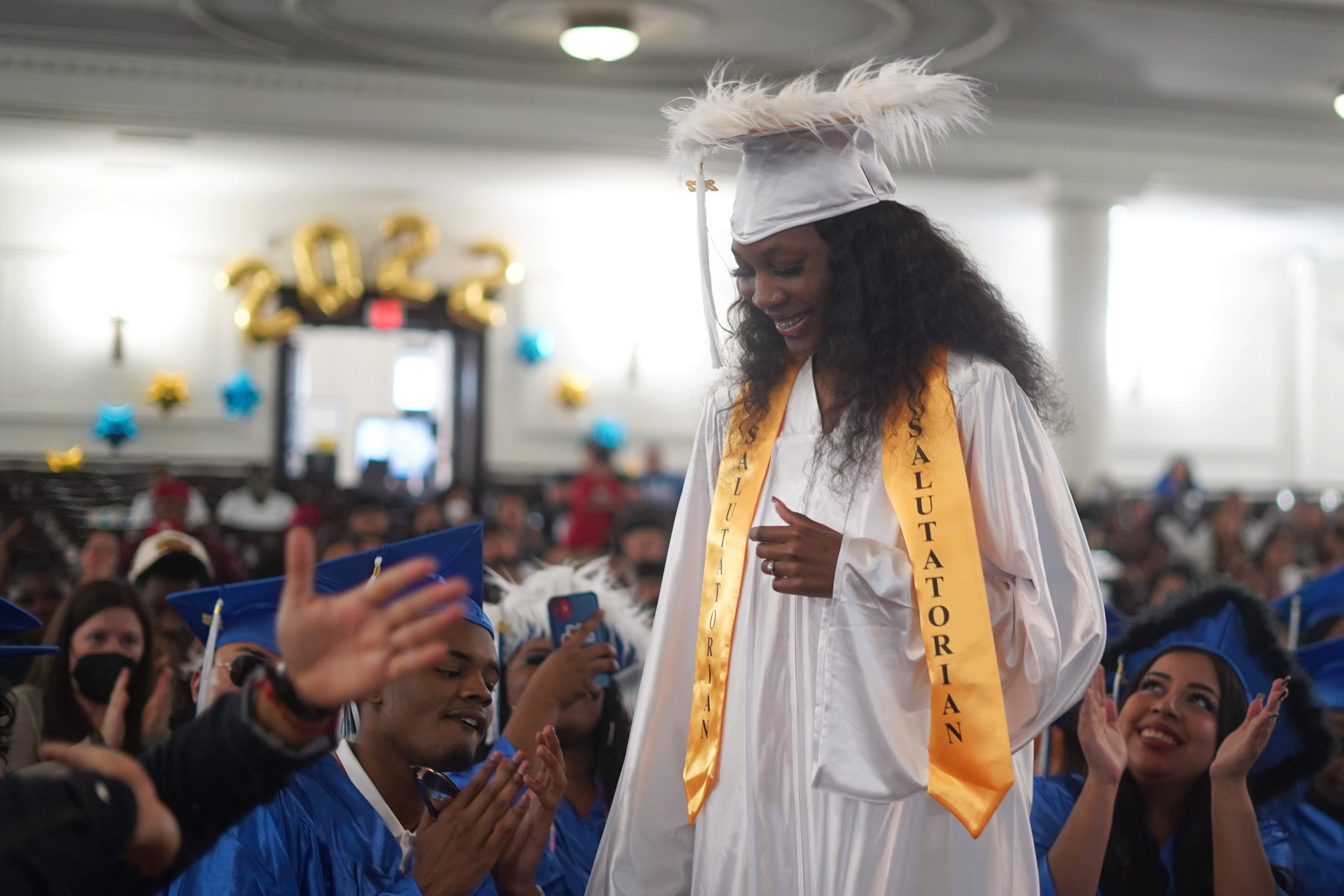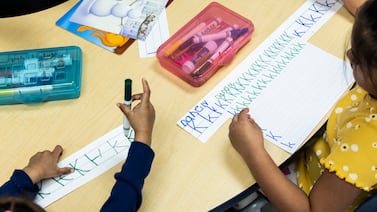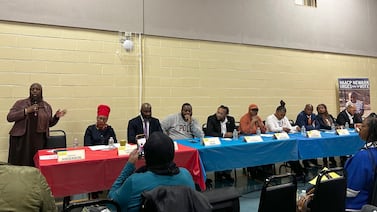Sign up for Chalkbeat Chicago’s free daily newsletter to keep up with the latest education news.
This story has been updated with a statement from Chicago Public Schools.
Chicago Public Schools’ class of 2023 had a high school graduation rate of 85%, an all-time high for the district, a new report found. In addition, college enrollment rates for Chicago students are rebounding from the COVID-19 pandemic and college completion rates remain steady.
Those findings are from a joint report from the To&Through Project and the University of Chicago’s Consortium on School Research. The report looked at “educational milestones” for Chicago’s high school graduates, including graduation rates, college enrollment, and college completion.
While more Chicago students are graduating from high school than before, work still needs to be done to ensure that students enroll in institutions of higher education and complete a degree or certificate, researchers found. The report also highlights the need to look at disparities among race/ethnicity, gender, English learners, and students with disabilities.
The report’s Post-Secondary Attainment Index, or PAI — a metric that takes into account the current trend of high school graduation, college enrollment, and college completion rates to predict the college completion rate for last year’s ninth graders— projects that 31% of Chicago’s ninth grade students who started in 2023-34 will complete a degree at a two-year or four-year institution within 10 years, or when they are about 25. This is only one percentage point higher than last year’s PAI projection.
Of 100 students who were in ninth grade in the 2023-24 school year, 31 would earn a college degree or credential by the time they are 25 if current high school graduates and college completion rates stay the same, according to the report. These ninth graders were in fifth grade when the coronavirus pandemic shuttered schools and students were forced to switch to remote learning.
The authors of the report say the PAI is not meant to predict what will happen, but to summarize current high school graduation and college completion rate trends.
Researchers who worked on the report have calculated a slightly higher graduation rate than the one used by Chicago Public Schools — which published data yesterday that noted a rate of 84%.
In the spring of 2023, boys graduated from high school in Chicago at a lower rate than girls, according to the joint report from the To&Through Project and the University of Chicago’s Consortium on School Research. The graduation rates for Black and Latino boys were lower than the district’s average at 78% and 82%. Students with Individualized Education Programs had a graduation rate of 55.9%.
Of those graduating students, 63% enrolled in a two-year or four-year institution of higher education either in the fall or spring after graduation – a 2.5% increase in enrollment compared to the Class of 2022. The enrollment rates for community colleges or technical schools have shifted over time. In 2018, the rate was 21.1%, but in 2023 the number dropped to 15.7%.
Chicago Public Schools officials highlighted growing college enrollment rates on Thursday during a press conference on the district’s student academic achievement. They credited the district’s efforts to get more kids to earn early college credits, in part making college more affordable.
Alexandra Usher, director of data and research for the To&Through project, attributes the increase of the graduation rate to the district’s Freshman on Track work.
“It wasn’t just about the nuts and bolts of ‘Let’s stop failing freshmen.’ It was about the whole community within a building coming together, creating these team structures of adults ... to look at data on how students are doing,” said Usher. “I think it really was a culture and structure shift that happened.”
For some students, the pandemic did not deter plans for college. Dulce Robles, a senior at Prosser Career Academy in Belmont Cragin, knew since middle school that she would pursue college, she said on Thursday.
Robles, who is in the JROTC program and is also involved with multiple clubs at school, said she’s been interested in various subjects but primarily computer science. She also pursued a related internship.
“I really got more invested,” she said. “I’m like, ‘I wanna study this in college.’”
Chicago Public School officials touted high school students’ achievements in a statement to Chalkbeat Chicago on Friday. They noted that graduation rates are at an all-time high, more CPS graduates have enrolled in college in the last two decades, and college completion rates have improved by five percentage points in the last five years.
“These accomplishments are notable, especially as the District’s rates on college enrollment, persistence, and completion are much higher compared to other urban districts with high proportions of minority and low-income students,” CPS officials said in the statement.
One area of concern in the report is students’ college completion rate. For the graduating class of 2017, students who immediately enrolled in four-year institutions had a college completion rate of 54% within six years. Those who immediately enrolled in a two-year college had a 31% completion rate within six years.
For Black and Latino boys who graduated from Chicago Public Schools in 2017, fewer than one-third who immediately went to college upon graduation completed their time at a four-year college or university within six years.
Students who start college later than the fall after graduating high school were less likely to complete their bachelor’s degree or associate degree or certificate. For students who did not immediately go to college after graduating, only 1.8% of students who graduated from Chicago schools in 2017 completed their time at a four-year college and only 2.5% graduated from a two-year institution.
Dominique Mckoy, the executive director of the To&Through project, said increasing college completion rates is the next area to work on, but he is hopeful due to the partnerships between the K-12 system and colleges and universities.
“We’re seeing a lot of initiatives at the college level,” said McKoy. “Colleges are really taking a hard look at their policies, practices, collecting student voices and trying to be reflective and responsive to what they’re getting back.”
Correction 10/18/2024: The punctuation on Alexandra Usher’s comment on Chicago Public Schools’ Freshman on Track was changed to reflect the correct meaning.
Samantha Smylie is the state education reporter for Chalkbeat Chicago covering school districts across the state, legislation, special education and the state board of education. Contact Samantha at ssmylie@chalkbeat.org.
Reema Amin is a reporter covering Chicago Public Schools. Contact Reema at ramin@chalkbeat.org.






